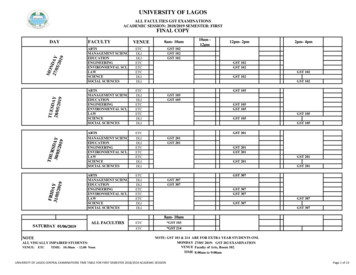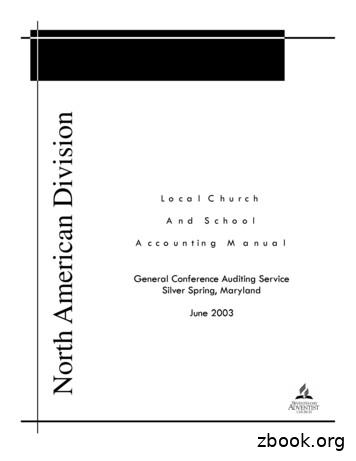HISTORY 21H.102 AMERICA SINCE 1865 - Dspace.mit.edu
HISTORY 21H.102AMERICA SINCE 1865Spring 2011Professor Megan NelsonTuTh 9:30-11:00 a.m.COURSE DESCRIPTIONThis course surveys the history of modern America, 1865 to the present, through the lens of protestideologies, strategies, and rhetoric. Through lectures, reading, and discussion, students will becomefamiliar with the major events, issues, struggles, and myths that been at the center of the Americanprotest tradition. We will pay particularly close attention to the racial, class, and gender constructionsand conflicts expressed in American written, visual, and material culture and how they have changedover time.21H.102 carries a CI-H designation; CI-H subjects provide a foundation in general expositorywriting and speaking. These subjects require at least 20 pages of writing divided among three to fiveassignments, of which at least one must be revised and resubmitted. CI-H subjects also offerstudents substantial opportunity for oral expression through presentations, student-led discussion,or class participation.REQUIRED TEXTSPrimary documents (PDFs located on class website)Eric Foner, Nothing But Freedom: Emancipation and Its Legacy (Louisiana State University Press, 1983).ISBN 0-8071-1189-9Alan Trachtenberg, The Incorporation of America (Hill and Wang, 1982). ISBN 0-8090-0145-4Jeanne Wakatsuki Houston, Farewell to Manzanar: A True Story of Japanese American Experience Duringand After the World War II Internment (Bantam Books, 1983). ISBN: 0-5532-7258-6Tim O‟Brien, The Things They Carried (Mariner Books, 2009). ISBN: 0-6187-0641-0COURSE REQUIREMENTSClass Participation (25%)While there is a major lecture component to this course, we will discuss the primary texts andsecondary sources you have read at different points during each lecture, and more fully duringThursday discussion sections. Therefore, your active and engaged participation in class is a majorcomponent of your grade. By “participation,” I mean thoughtful contributions to our conversationsthat engage with the documents, my questions, and the questions and comments of your classmates.We will not use a textbook for this course; therefore, I strongly recommend that you take detailednotes during lecture and discussion.You may bring laptops to class on Tuesdays for lecture; however, you may not bring laptops to ourThursday discussion sections.I expect you to bring your texts every day and have them available to consult during class.
2Each student will lead class discussion at least once during the semester; your preparation andperformance in this task will contribute to your class participation grade.Papers (75%)You will write three papers this semester, each one making use of primary documents, lecture, andsecondary source material. These papers will not be merely descriptive “book reports” but willrequire that you craft an original and forceful argument, cite evidence to prove your argument, andwrite creative analyses of these pieces of historical evidence. Your grade will reflect content andstyle—what you have to say and how you choose to say it.Each paper will be written in 12-point font, double-spaced, spell-checked, cited, edited, and stapled.Short Analytical Papers: Two 5-7-page papers in which you use multiple primary documents fromthe course list to make an argument about a significant development in modern American history.Research Paper: 10-12-page research paper that analyzes a single protest action in American historysince 1865. You will need to use at least 5 primary documents and 5 published secondary sourcesnot on this syllabus as sources for this paper. You will also write a paper proposal for this project(5%), which will be due well in advance of the final paper, and a rough draft (10%).Papers are due to me in hard copy the day they are due. NOTE: Papers will be marked downone full letter grade (10 points) for each day that they are late.COURSE EVALUATIONS AND GRADINGThere is no midterm or final examination in this class, but you must pass every portion of this classto pass the class as a whole.Paper EvaluationsI will evaluate your papers according to four elements:1. Argument and Use of Evidence—how creative and original is your argument? Is it, in fact, anargument at all or is it merely a factual point? What kinds of evidence do you use to prove yourpoints and do these examples and documents actually support your argument? Do you analyzethese pieces of evidence fully and creatively or merely present them and move on?2. Structure and Organization—how do you put your argument together throughout the paper? Doesthe structure of the paper follow the argument or is it a mish-mash of points linked looselytogether? Do you use effective transition sentences when you move from point to point and craftconclusion sentences that bring the reader back to your major argument?3. Grammar/Writing Style—how well do you articulate your points? Is your paper a muddle of poorword choices and spelling errors, or is it an eloquent and clean piece of intellectual work?4. Originality—is your argument innovative? Do you present and analyze your evidence in surprisingand creative ways? Does your paper contribute to our understanding of modern Americanculture?
3Final Grade PercentagesClass ParticipationShort Analytical PapersResearch Paper ProposalFinal Research Paper Rough DraftFinal Research Paper25%30% (15% each)5%10%30%COURSE POLICIESPlagiarism and CheatingFaculty members at MIT strive to foster a spirit of complete honesty and high standards of integrity.Any attempt by students to present as their own work any work that is not their own is regarded bythe faculty and administration as a major offense and renders the offenders liable to seriousconsequences, possibly suspension from the university. “Scholastic dishonesty” includes, but is notlimited to: cheating, plagiarism, collusion, falsifying academic records, misrepresenting facts, and anyact designed to give unfair academic advantage to the student.If you plagiarize a paper, you will earn a zero on the paper, which means that you will fail the class.Learning or Physical DifferencesAny student who, because of a learning or physical difference, may require some specialarrangements in order to meet course requirements should contact the instructor as soon as possibleto request necessary accommodation.Religious ObservancesA student who is absent from classes for the observation of a religious holy day will be allowed tocomplete an assignment scheduled for that day within a reasonable time after the absence. Thestudent must notify the professor of the absence no later than the fifteenth day after the first day ofthe semester in order to secure an excused absence and make-up privileges.Classroom TechnologyAs noted above, students may bring laptops to lectures on Tuesdays; however, you are not allowedto have laptops open during our discussion sections on Thursdays.This classroom is a cell phone-free environment—turn off your phones at the door.
4COURSE SCHEDULEPapers are to be turned in on the Tuesday session during the week listedReadings are to be completed for the Thursday discussion section during the week listed2.1IntroductionsLecture: Reconstruction and Redemption, 1865-1877Discussion2.3Readings:Eric Foner, Chapters 2 and 3 (“The Politics of Freedom” and “The Emancipated Worker,” inNothing but Freedom (1990), pp. 39-110.Mississippi Black Codes (1865)Howell Cobb to J.D. Hoover, January 4, 1868Edward Crosby, testimony regarding the KKK, 18722.8Lecture: Conquest and Survival in the West, 1860-19002.10DiscussionReadings:Alan Trachtenberg, The Incorporation of America (1982), Preface and Chapter 1 (“The WestwardRoute”)Rachel Haskell, from “Life in a Mining Camp”N.A. Jennings, from A Texas RangerChief Joseph, “Speech to a White Audience, 1879”The Dawes ActImages: John Gast, American Progress (1872); landscape paintings of Albert Bierstadt2.15Lecture: Industry and Labor, 1865-1900DUE: SHORT PAPER ONEDiscussion2.17Readings:Trachtenberg, The Incorporation of America (1982), Chapters 2-3 (“Mechanization Takes Command”and “Capital and Labor”)John D. Rockefeller, Testimony in Preliminary Report on Trusts and Industrial CombinationsPreamble to the Constitution of the Knights of LaborSadie Frowne, “The Story of a Sweatshop Girl”Andrew Carnegie, from Wealth[2.22—NO CLASS—MONDAY SCHEDULE]2.24Lecture/Discussion: Urban Culture, 1865-1900Readings:Trachtenberg, The Incorporation of America (1982), Chapters 4 and 7 (“Mysteries of the Great City” and“The White City”)Thorstein Veblen, from The Theory of the Leisure ClassAdna Ferrin Weber, From The Growth of Cities in the Nineteenth CenturyJacob Reiss, “The Reign of Rum”Jane Addams, “Youth in the City”Theodore Dreiser, “The Bowery Mission”Images: The Ash Can School painters
53.1Lecture: Commonwealth and Empire, 1870-19003.13DiscussionReadings:Susan A. Brewer, “The „Divine Mission‟: War in the Philippines,” in Why America Fights: Patriotismand War Propaganda from the Philippines to Iraq (2009), pp. 14-45.Plessy v Ferguson Majority and Dissenting opinionsThe Chinese Exclusion ActRobert G. Ingersoll, from “Should the Chinese Be Excluded?”William McKinley, “Declaration of War”William Ransom Roberts, from “Under Fire in Cuba”“Platform of the American Anti-Imperialist League”3.8Lecture: World War I, 1917-1920DUE: RESEARCH PAPER PROPOSALDiscussion3.10Readings:Christopher Capozzola, Chapters 1-2 (“The Spirit of Selective Service” and “Between God andCountry: Objecting to the Wartime State”), from Uncle Sam Wants You, pp. 21-82.Theodore Roosevelt, “The Roosevelt Corollary to the Monroe Doctrine”“The Zimmerman Note”Woodrow Wilson, “Declaration of War against Germany”Robert C. Hoffman, from I Remember the Last WarImages: War Propaganda Posters3.15Lecture: The Great Depression and the New Deal, 1929-19403.17DiscussionReadings:Neil Maher, Introduction, Chapters 1-2 (“Franklin Roosevelt‟s Progressive Era Influences” and“The Evolution of CCC Conservation”), from Nature’s New Deal, pp. 3-76.Studs Terkel, “Two Views of the Great Depression,” from Hard Times“Dust and the Nation‟s „Bread-Basket”Letters to New DealersJames Agee and Walker Evans, from Let Us Now Praise Famous MenFrank Stokes, from “Let the Mexicans Organize”Images: FSA photographs[3.22-3.24—NO CLASS—SPRING BREAK]3.29Lecture: World War II, 1940-1945DUE: SHORT PAPER TWODiscussion3.31ReadingsJeanne Wakatsuki Houston, Farewell to ManzanarFranklin D. Roosevelt, “The Four Freedoms”Franklin D. Roosevelt, “War Message to Congress”Soldiers‟ Letters HomeKorematsu v United States opinionsA. Philip Randolph, from “Call to Negro America to March on Washington”
6Excerpts from The Homefront“The Changing World for Women”Images: War Propaganda posters; Norman Rockwell, “The Four Freedoms”4.5Lecture: The 1950s4.7DiscussionReading:Elaine Tyler May, “Cold War—Warm Hearth: Politics and the Family in Postwar America,” in SteveFraser and Gary Gerstle, eds., The Rise and Fall of the New Deal Order, 1930-1980 (1989), pp.153-181.“Up from the Potato Fields”“What T.V. Is Doing to America”Edith Stern, “Women are Household Slaves”Willard Waller, “The Coming War on Women” (1945)Betty Friedan, from The Feminine Mystique4.12Lecture: The Civil Rights Movement 1945-1968DUE: ORIGINAL RESEARCH PAPER (DRAFT)Discussion4.14Readings:Jacquelyn Dowd Hall, “The Long Civil Rights Movement and the Political Uses of the Past,” Journalof American History 91 (March 2005): 1233-1263Brown v Board of Education of Topeka Unanimous DecisionHerman Talmadge, “Response to the Brown Decision”Rosa Parks, from Rosa Parks: My StoryMartin Luther King, Jr., from “Letter from Birmingham Jail”George C. Wallace, “Speech in Atlanta,” July 1964Martin Luther King, “I Have a Dream”[4.19—NO CLASS—PATRIOTS DAY]4.21Lecture/Discussion: Wars at Home and Abroad, 1965-1974Readings:Tim O‟Brien The Things They CarriedBob Dylan, “The Times They Are A-Changing”Tom Grace, on the Shootings at Kent StateReport, President‟s Commission on Campus UnrestTom Hayden, from “The Port Huron Statement”4.26Lecture: The Politics of Identity and Protest, 1960s-1970s4.28DiscussionReadings:Robert Gioielli, “Getting the Lead Out: Environmental Politics in 1970s St. Louis,” Journal of UrbanHistory 36, no. 4 (July 2010): 429-446.Stokely Carmichael, from Black PowerGloria Steinem, ERA Hearings StatementRoe v Wade Majority OpinionCesar Chavez, from Cesar Chavez: Autobiography of La Causa
75.3Lecture: The Rise of the Right and the Reagan Era, 1974-19885.5DiscussionReadings:Blake Ellis, “An Alternative Politics: Texas Baptists and the Rise of the Christian Right, 1975-1985,”Southwestern Historical Quarterly 112, no. 4 (April 2009): 361-386.Jerry Falwell, from Listen AmericaRonald Reagan, “The „Evil Empire‟”“Greed is Good,” from Wall StreetJesse Jackson, from “Common Ground and Common Sense”5.10Lecture: Modern America, 1988-presentDUE: FINAL RESEARCH PAPERDiscussion5.12Readings:Ussama Makdisi, “Anti-Americanism in the Arab World: An Interpretation of a Brief History,”Journal of American History 89 (September 2002): 538-557.“The National Security Strategy of the United States, September 2002”Fareed Zakaria, “The Arrogant Empire”Robert D. Putnam, from “Bowling Alone”Cindy Sheehan, “It‟s Up to You Now”Malcolm Gladwell, “Small Change: Why the revolution will not be tweeted” (2010)
MIT OpenCourseWarehttp://ocw.mit.edu21H.102 The Emergence of Modern America 1865-PresentSpring 2003For information about citing these materials or our Terms of Use, visit: http://ocw.mit.edu/terms.
Edward Crosby, testimony regarding the KKK, 1872 . 2.8 Lecture: Conquest and Survival in the West, 1860-1900 . 2.10 Discussion . . John Gast, American Progress (1872); landscape paintings of Albert Bi
4 GRI 102: General Disclosures 2016 6. Reporting practice 33 Disclosure 102-45 Entities included in the consolidated financial statements 33 Disclosure 102-46 Defining report content and topic Boundaries 34 Disclosure 102-47 List of material topics 35 Disclosure 102-48 Restatements of information 35 Disclosure 102-49 Changes in reporting 36 Disclosure 102-50 Reporting period 36
Belles-Soeurs Théâtre musical 8 mars - 7 avril, 21h dimanche 15h, relâche les lundis, et les 11, 15, 22 et 29 mars et le 5 avril générales de presse: 8, 9, 10, 13 et 14 mars à 21h d’après Les Belles-Sœurs de Michel Tremblay livret et paroles René Richard Cyr musique Daniel Bélanger Distribution au dos mise en scène René Richard Cyr
Kung Fu (Wushu) Les entraînements de Kungfu (wushu) sont basés à la fois sur l'étude de ji ben gong (travail de base) et d'enchaînements codifiés (taolu) de style moderne Chang Quan. Ils développent tonus, souplesse, et Niveau Jour º Horaire Lieu Adultes (et Ados à partir de 15 ans) Mardi 19H - 21H Lyon 8ème Jeudi 19H - 21H Lyon .
19A, 19B 7100 & 21H 7000 Vertical Turbine Pumps 5 09/03/13 Fairbanks Nijhuis Congratulations! You are the owner of the finest pump commercially available. If you give it the proper care as outlined and recommended by this manual, it will provide you with reliable service and long life. .
gst 201 8am- 10am gst 102 gst 102 gst 102 gst 105 gst 105 gst 105 12pm- 2pm gst 102 gst 102 gst 102 gst 105 gst 105 gst 105 y 9 arts management sciences education engineering environmental sci. law law science social sciences arts day faculty science social sciences arts management sciences
EXCERPTS FROM THE CHURCH MANUAL Section 101 Church Officers and Their Duties 101.01 Their Qualifications Section 102 The Church Treasurer 102.01 A Sacred Work 102.02 Church Treasurer the Custodian of All Funds 102.03 Conference Funds 102.04 Sabbath School Funds 102.05 Adventist Youth
Editorial Policy Contents Introduction Management Environmental Social Governance Assurance Hitachi Sustainability Report 2020 102-45 102-50 102-51 102-56 102-46 102-52 02 Basic Concept The Hitachi Sustainability Report 2020 presents our stance toward environmental (E), social (S), and governance (G) issues, and details the activities we undertook in relation to these in fiscal 2019.
3 Wild and Cultivated Species of Cotton 27. G.armouianum D2-1 America 28. G.harknessii D2-2 America 29. G.klotzschianum D3-K America 30. G.davidsonii D3-d America 31. G.aridum D4 America 32. G.raimondii D5 America 33. G.gossypioides D6 America 34. G.lobatum D7 America 35. G.trilobum D8 America 36. G.laxum D9 America 37. G.turneri “D .























